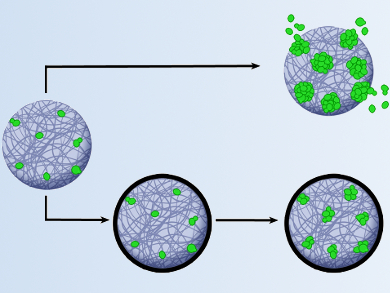Microbial microencapsulation, the confinement of microbes within microcapsules, aims to protect microorganisms from external stresses by physically isolating them from their environment. Although encapsulated microorganisms have been used in various areas including cell therapy, sensors, and biocatalysis, uncontrolled growth results in their release from the capsule, thus leading to undesired external exposure of the cells.
A group led by Insung S. Choi, KAIST, Daejeon, South Korea, used a core/shell approach to regulate microbial growth by simply coating alginate microbeads with polydopamine (PD) under physiologically relevant conditions. The polydopamine shells were found to affect microbial growth in the alginate core while maintaining cell viability, which granted control over cell release.
The effects of the polydopamine shells on microbial growth were investigated in detail by modulating the concentration of nutrients in the cell culture media and varying the shell thickness.
- Control of Microbial Growth in Alginate/Polydopamine Core/Shell Microbeads,
Beom Jin Kim, Taegyun Park, So-Young Park, Sang Woo Han, Hee-Seung Lee, Yang-Gyun Kim, Insung S. Choi,
Chem. Asian J. 2015.
DOI: 10.1002/asia.201500360
Also of Interest
- Cytoprotective Alginate/Polydopamine Core/Shell Microcapsules in Microbial Encapsulation,
Beom Jin Kim, Taegyun Park, Hee Chul Moon, So-Young Park, Daewha Hong, Eun Hyea Ko, Ji Yup Kim, Jong Wook Hong, Sang Woo Han, Yang-Gyun Kim, Insung S. Choi,
Angew. Chem. Int. Ed. 2014, 53, 14443–14446.
DOI: 10.1002/anie.201408454 - 10 Years Ago And Now: Insung S. Choi,
ChemViews Mag. 2014.
DOI: 10.1002/chemv.201400112
Chemistry – An Asian Journal speaks with researchers about how their world has changed over the past decade




